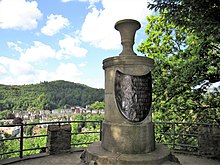Johann Friedrich Möller (clergyman, 1750)


Johann Friedrich Möller (born December 6, 1750 in Elsey ; † December 2, 1807 ibid) was a German preacher , researcher and politician .
Life
Johann Friedrich Möller was born in 1750 in the village of Elsey, today part of the Westphalian city of Hagen, at that time an independent town in the county of Limburg . He attended high school in Dortmund in 1766 and studied in Halle (Saale) from 1767 . In 1774 he succeeded his father against his will as collegiate preacher in Elsey, from 1793 until his death in 1807 he was pastor in Elsey.
In the free worldly, aristocratic women's monastery Elsey , which emerged from a monastery founded around 1220 by the Count's House of Altena-Isenberg , Johann F. Möller observed the political, social, cultural and societal development in Westphalia and the Old Kingdom towards the end of the 18th century .
He formulated several important petitions for the bourgeoisie in Hagen and the county of Mark . For example, in 1795 he drew attention to the catastrophic economic and social consequences of the revolutionary wars against France . He wrote articles against the feared robber gangs around 1800 and complained about the inactivity and inability of the Prussian government agencies. In 1801 Möller wrote a report on the discovery of cave bear bones, in 1804 on several burial mounds near Elsey. At the beginning of 1806, when the rumor spread that the County of Mark was to be ceded by Prussia to France, Möller wrote two petitions to King Friedrich Wilhelm III on behalf of the Hagen district and city deputies in March and May of the same year . who thereupon in June 1806 assured his loyalty to the subjects of the Brandenburg region.
Möller died on December 2nd, 1807 in Elsey in his home in Wiedemhof . After the collapse of French rule in the region in November 1813, citizens of Hagen and Limburg erected a memorial to the former canon preacher on May 7, 1814 on the little cliff in Elsey.
Publications (monographic publications only)
- The Westphalian Mark , Hagen 1788.
- About the noble, secular Fräulein-Stift Elsey in the county of Hohen-Limburg , Hagen 1802.
- About Hohensyberg, the old Saxon festival, the subsequent castle, its ruins and other antiquities there , Dortmund 1804.
- Petition to Friedrich Wilhelm III , Hagen 1806.
literature
- Heike Abberger: Johann Friedrich Möller (1750-1806). An overview of the life and work of the "Pastor of Elsey" at the turn of the 18th to the 19th century. In: Yearbook of the Association for Orts- und Heimatkunde in the Grafschaft Mark , 93/93 (1997), pp. 185–203.
- Ralf Blank , Stephanie Marra , Gerhard E. Sollbach: Hagen. History of a city and its region. Food 2008.
- Ralf Blank: "If you pass there, look up and bless your memory". Johann Friedrich Möller (1750-1807) and regional historical memory. In: Beate Hobein, Dietmar Osses (ed.): "Until the most distant, most distant time ...". Hagen and his monuments, Hagen 1996 [= Hagener Stadtgeschichte (n) 6], pp. 31–42.
- Arnold Mallinckrodt (ed.): The pastor of Elsey. The most interesting from the estate of Johann Friedrich Möller. Dortmund 1810. (Title: Digitalisat , Volume 1: Digitalisat , Volume 2: Digitalisat )
- Wilfried Reininghaus : The historical work of the Elsey pastor Johann Friedrich Möller. A contribution to Westphalian regional historical research around 1800. In: Westfälische Zeitschrift 144 (1994), pp. 135–165, pdf [2]
Web links
- Johann Friedrich Möller in the Lexicon of Westphalian Authors
- Association for local and local history Hohenlimburg: On the 200th anniversary of the death of Johann Friedrich Möller
- Bornefeld, Paul: Johann Friedrich Möller, his essence and work . In: Verein für Orts- und Heimatkunde Hohenlimburg eV born in 1957
| personal data | |
|---|---|
| SURNAME | Möller, Johann Friedrich |
| BRIEF DESCRIPTION | German preacher, researcher and politician |
| DATE OF BIRTH | December 6, 1750 |
| PLACE OF BIRTH | Elsey |
| DATE OF DEATH | December 2, 1807 |
| Place of death | Elsey |

